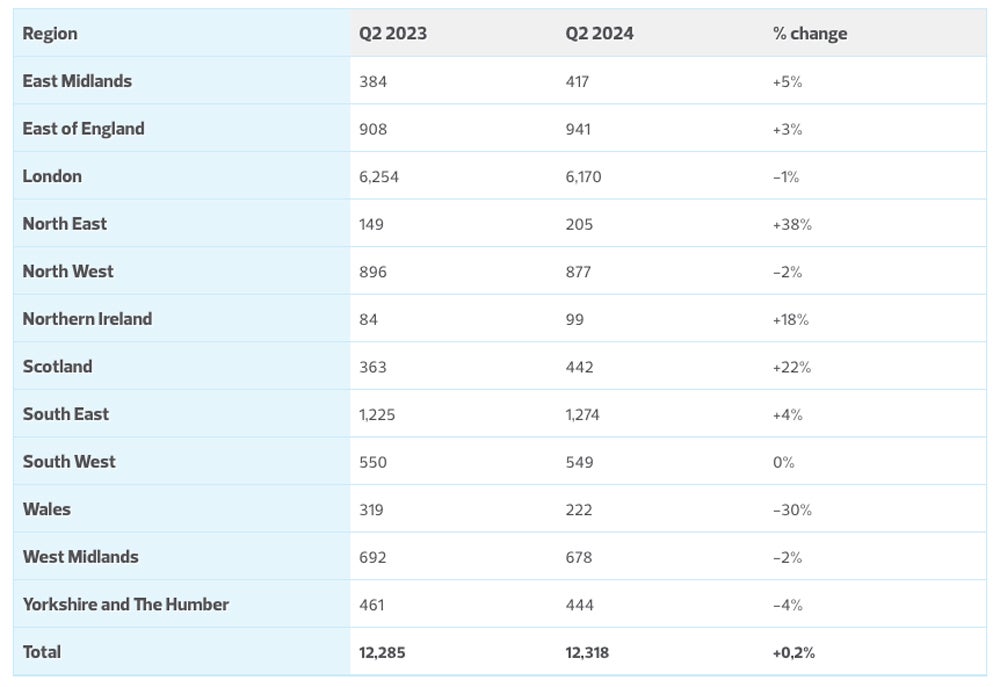According to accountancy firm RSM UK, the number of new tech companies being founded in the UK has suffered its first “marked decline” since 2022. In Q2 2024, there were just 12,318 new tech incorporations compared to 13,802 in Q1, representing a decline of 11%.
The number of tech additions is considered a good indicator of industry growth, and so far this figure has suggested prosperity. The first quarter of 2024 saw the highest number of tech additions in five years, while the total number of new companies formed in 2023 increased by 22% over 2022, representing the largest percentage increase on record.
Ben Bilsland, partner and chief technology officer at RSM UK, said in a press release that the latest figures suggest “the tide of technological growth may be turning.”
“While on the one hand the new government is grappling with a £22bn budget deficit, on the other it cannot afford to take for granted a strong tech sector, which contributes around £150bn a year to the UK economy,” he said.
“With this in mind, and with high interest rates and persistent inflation continuing to present economic challenges, we encourage the government to do everything possible to maintain growth in the sector.”
Last week it was revealed that the new Labour government had removed £1.3bn of funding that the Conservatives had earmarked for AI infrastructure. The King’s speech in July also made little mention of the tech sector and did not formally announce any new legislation on the matter, including the long-awaited AI Bill.
Bilsland said: “We need the government to focus on the bigger picture again and support the sector to develop technology that will enable the UK to compete on the global stage. In the US, tech giants like Google and Amazon are driving huge economic growth. This raises the question of whether the UK government can afford not to invest in the tech sector.
“We felt the King’s Speech was a missed opportunity to address the technology skills gap with more training and address the AI landscape. Despite limited resources, we urge the new Labour government to consider helping the sector in the next budget, with increased tax breaks and access to deep computing to support the advancement of AI.”
London recorded the highest number of new additions in the second quarter, with 6,170. However, the figure was 16% lower than in the first quarter. In fact, all UK regions saw declines in the number of tech new additions compared to the previous quarter, with Northern Ireland the biggest decline, with a 22% drop.
Despite a reduction in new tech companies over the past six months, most regions saw more tech company additions in Q2 2024 than in Q2 2023. This is particularly true in the North East and Scotland, which saw year-on-year increases of 38% and 22% respectively. The number of tech company additions across the UK in Q2 2024 was 0.2% higher than the same figure in Q2 2023.

It's not just UK tech that's suffering
On Monday, the shares of the “magnificent seven” American technology companies (NVIDIA, Meta, Alphabet, Microsoft, Amazon, Tesla and Apple) fell sharply, losing a total of $1.3 trillion in five days. The sell-off is related to several factors, but one of the main ones is that investors are starting to worry about the return on investment in AI.
Alphabet spent $13.2 billion in the second quarter as a result of investments in AI infrastructure, up 91% from Q2 2023, putting pressure on profit margins. Meta CEO Mark Zuckerberg also said on an earnings call that he expects it will be “years” before the company monetizes its AI products.
Goldman Sachs equity analyst Jim Covello wrote in a recent report: “Despite its high price tag, the technology is far from where it needs to be to be useful… Overbuilding things that the world has no use for or is not ready for often ends badly.”
David Cahn, a partner at Sequoia Capital, argued in a blog post that the AI industry would need to generate $600 billion a year to pay for its hardware spending.
Semiconductor companies are facing their own problems: shares of Intel, Samsung, TSMC and SoftBank Group, the parent company of Arm Holdings, all fell on August 1.
Intel shares fell 26%, their worst day in 50 years, after it suspended its dividend and laid off 15% of its workforce. The moves were an attempt by the company to regain a dominant position in the sector after being overtaken by numerous competitors in the S&P 500, but they also dragged down global semiconductor stocks. Rumors that NVIDIA will delay the launch of its new chip due to design flaws also helped its shares fall 6.3%.
Investors are also preparing for impending interest rate cuts in the United States, meaning they are prioritizing small-cap stocks, which tend to benefit most from lower rates.












